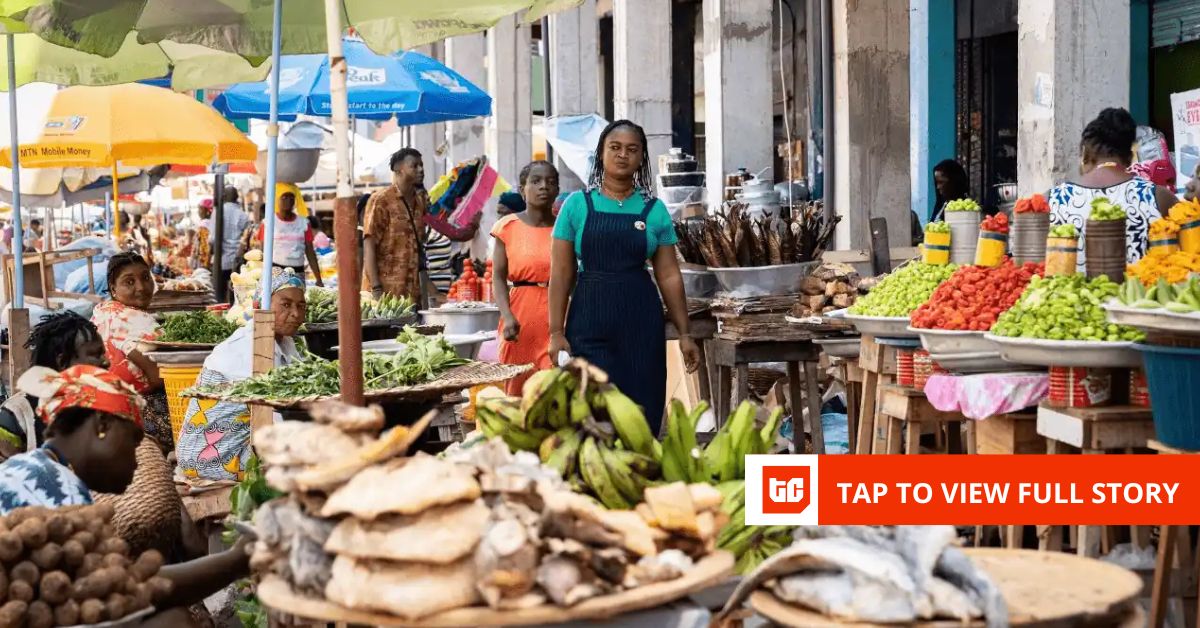This year in Nigeria, a ram for Eid costs upwards of or close to ₦400,000—more than the national minimum wage of 4-5 months. By Christmas, chickens may become equally emblematic of scarcity. These are not festive exaggerations; they are market signals—microeconomic symptoms of a deeper macroeconomic disease. The price of survival is rising, while the machinery of value creation remains dangerously idle.
Across Africa, and Nigeria in particular, we are witnessing an economic paradox: rising financial inclusion amidst declining productivity; expanded access to money, yet diminished access to value. It is tempting to diagnose this as inflation. But inflation is a fever—there is an infection beneath it. And the name of that affliction is deindustrialisation by digitisation.
The consumption trap
In Nigeria, over 70% of household income is spent on food, transport, and other basic needs. This is not prosperity. It is survival. The marginal propensity to consume is high not because Nigerians are consuming more, but because they can afford less. Wages stagnate, prices surge, and every naira earned is immediately spent to ward off hunger, illness, or insecurity.
In such an economy, savings are rare, capital formation is shallow, and the multiplier effects of commerce are weak. What little money is generated circulates rapidly—but does not accumulate. It moves, but it does not multiply.
Fintechs were supposed to change this. They promised inclusion. What they delivered was velocity.
The fintech paradox: Movement without multiplication
Over the past decade, more than $5 billion has been invested in African fintech startups. We were promised transformation. What we received was transaction.
Mobile money, digital wallets, and agency banking have made it easier than ever to move naira, cedis, and shillings across geographies. But these tools, elegant as they may be, have become lubricants for a fundamentally extractive economy. They facilitate consumption but do not enable production.
A fintech app may help a yam farmer in Kaduna receive digital payments. But that same app will also enable him to purchase imported pesticides, pay for generator fuel, and order foreign rice he can’t afford to eat. This is not financial empowerment. It is a high-speed treadmill of poverty.
Money, unlike a machine or a tool, is not inherently productive. It is a medium, and not a means. Without factories, farms, or forges, fintechs are simply better pipes for an empty well.
The false gods of inclusion
Most African fintechs are not banks. They do not lend at scale, build infrastructure, or fund innovation in manufacturing or agriculture. Instead, they are payment gateways, identity services, and switching engines—designed more to extract transaction fees than to enable transformation.
Their incentives are shaped by capital—global capital. And global capital is risk-averse. It seeks fast returns, not long-term development. Thus, most fintechs pivot toward merchant payments, diaspora remittances, or KYC compliance. These are low-risk, high-frequency activities that enrich platforms but rarely build national capacity.
We were told inclusion would democratise finance. But in truth, inclusion has often meant being included in consumption and not in wealth creation.
Industrialisation ≠ Imitation
The answer is not to mimic 20th-century models of industrialisation. Africa cannot replicate the import substitution strategies of post-war Latin America or the export-led growth of East Asia. The global context has changed: climate constraints, demographic pressures, fragmented supply chains, and capital flight have made yesterday’s blueprints obsolete.
Nor will digital optimism suffice. Digitisation without production merely creates smoother pathways for dependency.
If Africa is to industrialise, it must do so on its terms. This means productive innovation rooted in local realities: modular micro-factories, agro-processing hubs, distributed logistics, and mobile-enabled cooperatives. These are not romantic visions. They are pragmatic necessities.
Leapfrogging must be redefined. It does not mean skipping industrialisation. It means reinventing it and anchoring not in steel mills alone, but in smart, distributed infrastructure that amplifies the informal economy rather than bypasses it.
Fintech as infrastructure — not interface
There is still a future for fintech—but only if it evolves.
Imagine fintech as a backbone for distributed manufacturing: underwriting toolmakers, financing cold-chain cooperatives, offering working capital to carpenters, weavers, and blacksmiths. Picture a financial OS that ties digital identity to productive capacity; that tracks inventory, not just invoices; that enables ownership, not just access.
This is fintech as productive infrastructure, a scaffolding for the real economy, not just a slick interface for digital consumption.
The government that isn’t there
The Nigerian state, meanwhile, has mastered a new form of governance: minimalism by default, not design. It neither delivers services nor provides safety nets. It taxes without transparency, borrows without discipline, and regulates without consistency. Infrastructure decays while policies oscillate. The state has outsourced governance to the governed.
And yet, Nigerians persist. There is ingenuity in the chaos. But ingenuity needs scaffolding. What could emerge, if nurtured, is a new kind of bottom-up economic federalism where informal networks, cooperatives, and municipalities operate semi-autonomously but within a framework of shared infrastructure, data, and trust.
The question is whether this latent architecture will be supported or smothered by both the state and the market.
Making the weird work
Nigeria’s economy is weird. Informality is the norm. Trust is hyperlocal. Growth is improvisational. But weird does not mean weak. It means something different. And perhaps it is in embracing this difference and not erasing it that we may find a path to real, lasting industrialisation.
Let us stop worshipping apps. Let us start investing in capacity. Let us build systems that not only digitise transactions but also dignify production.
Rams are expensive. Chickens will be too. And QR codes won’t change that. But solar-powered irrigation might. Cold storage in Sokoto might. Modular tractor forges in Funtua might.
If we must live in a weird system, can we at least make it productively weird?
Abubakar Sadiq Amao is a technical analyst and fintech founder with expertise in economics, blockchain, and product development. He enjoys building financial tools at the intersection of retail and commerce. He is currently leading Chappi while pursuing an MBA.
Mark your calendars! Moonshot by is back in Lagos on October 15–16! Join Africa’s top founders, creatives & tech leaders for 2 days of keynotes, mixers & future-forward ideas. Early bird tickets now 20% off—don’t snooze! moonshot..com.











